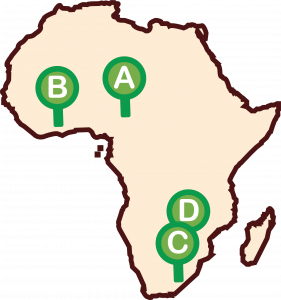Project Leads
The Problem
Primary open angle glaucoma (POAG) is the most common single cause of permanent blindness in Africa. Progressive vision loss associated with POAG can go unnoticed by the patient until it reaches advanced stages, and treatment strategies are not robust or widely available. Furthermore, POAG is more clinically aggressive and occurs at an earlier age in African populations compared to other populations. Finally, glaucoma and blindness are highly stigmatized within local communities, placing a social burden on those affected and their families.
Project Strategy
- Collect DNA samples from 8,000 healthy and affected individuals (and their families) from six recruitment sites across the continent.
- Analyze and compare these samples to determine how one’s genes affect their risk of being affected by glaucoma to inform novel treatment strategies.
- Engage communities to educate Africans on how glaucoma affects one’s vision and when to visit an eye doctor, encouraging affected individuals to begin treatment sooner to mitigate the impact of the disease.
Outcomes & Impact
Genetics of glaucoma: Analysis of 4,000 archival DNA samples identified APBB2, a new genetic risk factor for glaucoma that is found only in individuals of African ancestry. This risk factor is also involved in Alzheimer’s disease, raising the possibility of new treatments that could help patients with both diseases. The researchers have now collected an additional 6,500 samples that are being analyzed in order to replicate and extend these findings. They plan to complete collection of the planned 8,000 samples by the end of the project.
Baseline Clinical Data: Many ocular measurements have been collected on African glaucoma patients as well as healthy controls, and this data will lead to improved diagnosis and characterization of glaucoma.
Community Engagement: Multiple community engagement and educational meetings have been conducted, and the results of these meetings are published.
Capacity Building: Multiple eye clinics have received state-of-the-art diagnostic equipment which is improving patient care.
Education: Education and training builds future research capacity. Many clinical staff have been trained in patient care, and the project statistician has learned modern genetic analysis.
Sustainability: Thousands of plasma samples have been collected, and can be used in the future to identify metabolomic and environmental risk factors in glaucoma. Two new NIH-funded grants include the Eyes of Africa data and personnel. A scientific advisory board for this project has been established.
Project Sites

A: Nigeria
University of Ibadan, University of Nigeria, Nigerian Navy Reference Hospital
B: Ghana
Lions International Eye Centre, Korle-Bu Teaching Hospital
C: South Africa
The Eye Centre
D: Malawi
Lions Sight-First Eye Hospital
Non-African Collaborators:
USA: Duke University

